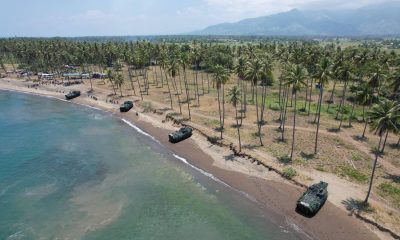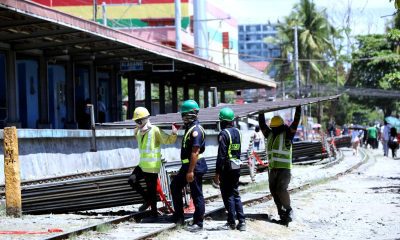Headline
Thailand’s army ruler nominated for new post as prime minister, 3 months after coup
BANGKOK, Thailand—Three months after overthrowing Thailand’s last elected government, this Southeast Asian nation’s junta leader is stepping out of his army uniform for good—to take up the post of prime minister in a move critics say will only extend his time at the helm and consolidate the military’s grip on power.
Thailand’s junta-appointed legislature voted unanimously Thursday to name Gen. Prayuth Chan-ocha to the new job during a session in Bangkok.
There was little doubt over the outcome since Prayuth was the only candidate.
The 60-year-old leader is due to retire from the army next month but until then he can hold both positions. Thursday’s appointment appears aimed in part at keeping him at the helm as the military implements sweeping political reforms that critics say are designed to purge the influence of the ousted ruling party and favour an elite minority that has failed to win national elections for more than a decade.
Prayuth has effectively served as de facto premier since staging the May 22 coup. For several years before that, he held the position of army chief—a post that many regard as one of the most powerful and influential in a country where the military has seized power 12 times since the end of absolute monarchy in 1932.
“He could have refused the job, but what would be the point?” said Pavin Chachavalpongpun, a Thai professor of Southeast Asian studies at Japan’s Kyoto University whose passport was revoked after criticizing the coup and refusing to respond to a junta summons ordering home.
Prayuth’s appointment by the National Legislative Assembly must be approved by King Bhumibol Adulyadej, a formality likely to occur within a week. Prayuth will then name a 35-member Cabinet.
The vote was the latest in a series of moves by the junta to consolidate power on its own terms.
In July, the military adopted a temporary 48-article constitution. Shortly afterward, the junta appointed the assembly that is dominated by active and retired duty officers.
Earlier this week, Prayuth appeared at Parliament to present next fiscal year’s budget; he was dressed for the first time in public in a business suit, an apparent signal he was readying for the new job.
Prayuth has justified the coup by saying the army had to intervene to end half a year of protests that had paralyzed the government and triggered sporadic violence that left 28 people dead and hundreds injured. While stability has been restored and life has largely returned to normal, the junta has been criticized for cracking down harshly on even the slightest dissent.
Most politicians from the ousted ruling party, including former Prime Minister Yingluck Shinawatra, were briefly detained by the army—and released only after signing agreements effectively preventing them from speaking out. Violators, the junta has warned, will face prosecution.
Critics, though, say reconciliation—and any legitimate debate on the divided nation’s fate—cannot take place in a climate of fear.
The May putsch was swiftly condemned by Western powers, but Thailand’s relations with key Asian nations remain unchanged. Concerns over human rights abuses and the restoration of democracy were not even mentioned publicly earlier this month during a regional foreign ministers summit earlier hosted by Myanmar.
Thailand has been deeply divided since 2006, when former Prime Minister Thaksin Shinawatra—Yingluck’s brother—was toppled after being accused of corruption, abuse of power and disrespect for Bhumibol.
Thaksin, a former telecommunications billionaire whose political allies have won every national election since 2001, lives in self-imposed exile in Dubai but remains an intensely polarizing figure. He is highly popular among the poor in Thailand’s north and northeast, but despised by a Bangkok-based elite backed by the army and staunch royalists who view him as a corrupt demagogue who bought votes with populist promises.
Although Prayuth has promised to eventually restore democracy and hold elections as early as 2015, Pavin, the analyst, said the junta was working to remove all traces of Thaksin’s influence before then.
Ultimately, “the elite want to gain control over politics. In the last decade, their domination was taken away by Thaksin through elections,” Pavin said. “They are trying to weaken that now … and ensure that politicians linked to Thaksin can’t come back.”
Thailand has not had a prime minister since caretaker premier Niwattumrong Boonsongpaisan’s government was ousted in the May coup. Niwattumrong held the position only briefly to replace Yingluck, who took office after a landslide 2011 election but was forced to resign for nepotism in a court case her supporters say was politically motivated.
Prayuth’s governance style differed markedly from his predecessor. The gruff leader has veered beyond usual government policy talk and his speeches have sometimes taken on a paternalistic tone.
Taking to the airwaves almost every Friday night to explain the junta’s objectives, Prayuth has urged people to recycle their trash, to avoid credit card debt, and even to avoid shopping if they feel stressed. He has also launched a “national happiness” campaign and spelled out the “12 core values of the Thai people,” key among them, showing respect for the nation’s king.
Associated Press writer Thanyarat Doksone contributed to this report.






















